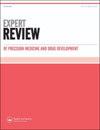Predicting therapeutic response through biomarker analysis in psoriatic arthritis, an example of precision medicine
IF 1.2
Q4 PHARMACOLOGY & PHARMACY
Expert Review of Precision Medicine and Drug Development
Pub Date : 2020-01-02
DOI:10.1080/23808993.2020.1724509
引用次数: 4
Abstract
ABSTRACT Introduction: Psoriatic arthritis (PsA) is a heterogeneous inflammatory arthritis for which effective targeted therapies are now available. However, despite such advances up to 40% of patients fail to meet the primary endpoint in clinical trials. Current approach to therapy does not take it account clinical or molecular heterogeneity and is based on trial-and-error. It is envisioned that choosing therapies based on appropriate molecular biomarker profiles will help choose the appropriate therapy for a patient and as such lead to better treatment outcomes with reduced costs and less exposure to less effective therapies. Areas covered: The paper introduces PsA and briefly describes the clinical phenotype, pathogenesis, and current therapies. Current literature on biomarkers relating to PsA treatment response is reviewed. Limitations of the current approach, potential solutions to issues identified, and a path forward for research and potential clinical application in this area are discussed. Expert opinion: The likelihood that the current siloed approach to biomarker discovery will lead to meaningful clinically actionable tests to facilitate precision medicine in PsA is low. We envision that with collaborative and harmonized effort by all stakeholders using an inter-omic approach will lead to the development of robust predictive biomarkers for PsA treatment response.通过生物标志物分析预测银屑病关节炎的治疗反应——精准医学的一个例子
摘要简介:银屑病关节炎(PsA)是一种异质性炎症性关节炎,目前已有有效的靶向治疗方法。然而,尽管取得了这些进展,仍有高达40%的患者未能达到临床试验的主要终点。目前的治疗方法没有考虑临床或分子异质性,而是基于反复试验。可以预见,基于适当的分子生物标志物图谱选择疗法将有助于为患者选择适当的疗法,并因此带来更好的治疗结果,同时降低成本,减少对低效疗法的接触。涵盖领域:本文介绍了PsA,并简要描述了其临床表型、发病机制和目前的治疗方法。综述了目前有关PsA治疗反应的生物标志物的文献。讨论了当前方法的局限性、已发现问题的潜在解决方案,以及该领域研究和潜在临床应用的前进道路。专家意见:目前孤立的生物标志物发现方法将导致有意义的临床可操作测试,以促进PsA的精准医学的可能性很低。我们设想,通过所有利益相关者的合作和协调努力,使用组间方法,将开发出用于PsA治疗反应的强大预测生物标志物。
本文章由计算机程序翻译,如有差异,请以英文原文为准。
求助全文
约1分钟内获得全文
求助全文
来源期刊

Expert Review of Precision Medicine and Drug Development
PHARMACOLOGY & PHARMACY-
CiteScore
2.30
自引率
0.00%
发文量
9
期刊介绍:
Expert Review of Precision Medicine and Drug Development publishes primarily review articles covering the development and clinical application of medicine to be used in a personalized therapy setting; in addition, the journal also publishes original research and commentary-style articles. In an era where medicine is recognizing that a one-size-fits-all approach is not always appropriate, it has become necessary to identify patients responsive to treatments and treat patient populations using a tailored approach. Areas covered include: Development and application of drugs targeted to specific genotypes and populations, as well as advanced diagnostic technologies and significant biomarkers that aid in this. Clinical trials and case studies within personalized therapy and drug development. Screening, prediction and prevention of disease, prediction of adverse events, treatment monitoring, effects of metabolomics and microbiomics on treatment. Secondary population research, genome-wide association studies, disease–gene association studies, personal genome technologies. Ethical and cost–benefit issues, the impact to healthcare and business infrastructure, and regulatory issues.
 求助内容:
求助内容: 应助结果提醒方式:
应助结果提醒方式:


